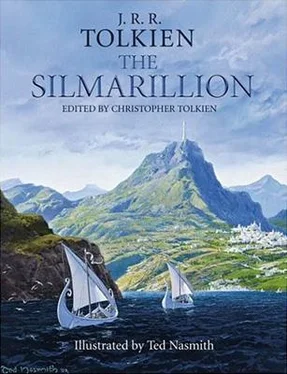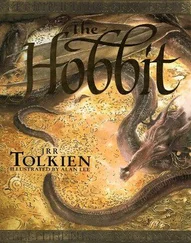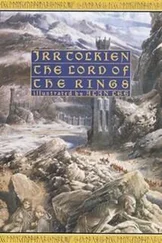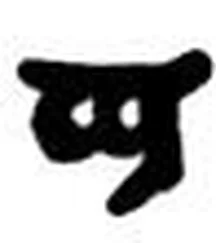romen 'uprising, sunrise, east' (Quenya) in Romenna. The Sindarin words for 'east', rhûn (in Talath Rhunen ) and amrûn, were of the same origin.
rond meant a vaulted or arched roof, or a large hall or chamber so roofed; so Nargothrond (see ost ) , Hadhodrond, Aglarond. It could be applied to the heavens, hence the name Elrond 'star-dome'.
ros 'foam, spindrift, spray' in Celebros, Elros, Rauros; also in Cair Andros, an island in the river Anduin.
ruin 'red flame' (Quenya runya ) in Orodruin.
ruth 'anger' in Aranrúth.
sarn '(small) stone' in Sarn Athrad ( Sarn Ford on the Brandywine is a half-translation of this); also in Sarn Gebir ('stone-spikes': ceber, plural cebir 'stakes'), rapids in the river Anduin. A derivative is Serni, a river in Gondor.
sereg 'blood' (Quenya serke ) in seregon.
sil- (and variant thil- ) 'shine (with white or silver light)' in Belthil, Galathilion, Silpion, and in Quenya Isil, Sindarin Ithil, the Moon (whence Isildur, Narsil; Minas Ithil, Ithilien ) . The Quenya word Silmarilli is said to derive from the name silima that Fëanor gave to the substance from which they were made.
sîr 'river', from root sir- 'flow', in Ossiriand (the first element is from the stem of the numeral 'seven', Quenya otso, Sindarin odo ) , Sirion; also in Sirannon (the 'Gate-stream' of Moria) and Sirith ('a flowing', as tirith 'watching' from tir ) , a river in Gondor. With change of s to h in the middle of words it is present in Minhiriath 'between the rivers', the region between the Brandywine and the Greyflood; in Nanduhirion 'vale of dim streams', the Dimrill Dale (see nan [ d ] and dú ), and in Ethir Anduin, the outflow or delta of Anduin (from et-sir ) .
sûl 'wind' in Amon Sûl, Súlimo; cf. súlimë, Quenya name of the third month of the year ( The Lord of the Rings Appendix D).
tal (dal) 'foot' in Celebrindal, and with the meaning 'end' in Ramdal.
talath 'flat lands, plain' in Talath Dirnen, Talath Rhunen.
tar- 'high' (Quenya tára 'lofty'), prefix of the Quenya names of the Númenórean Kings; also in Annatar. Feminine tári 'she that is high, Queen' in Elentári, Kementári. Cf. tarma 'pillar' in Meneltarma.
tathar 'willow'; adjective tathren in Nan-tathren; Quenya tasare in Tasarinan, Nan-tasarion (see Nan-tathren in the Index).
taur 'wood, forest' (Quenya taure ) in Tauron, Taur-im-Duinath, Taur-nu-Fuin.
tel- 'finish, end, be last' in Teleri.
thalion 'strong, dauntless' in Cúthalion, Thalion.
thong 'oppression' in Thangorodrim, also in Durthang (a castle in Mordor). Quenya sanga meant 'press, throng', whence Sangahyando 'Throng-cleaver', name of a man in Gondor ( The Lord of the Rings Appendix A [I, iv]).
thar- 'athwart, across' in Sarn Athrad, Thargelion; also in Tharbad (from thara-pata 'crossway*) where the ancient road from Arnor and Gondor crossed the Grey-flood.
thaur 'abominable, abhorrent' in Sauron (from Thauron) , Gorthaur.
thin(d) 'grey' in Thingol; Quenya sinda in Sindar, Singollo ( Sindacollo: collo 'cloak').
thôl 'helm' in Dor Cúarthol, Gorthol.
thon 'pine-tree' in Dorthonion.
thoron 'eagle' in Thorondor (Quenya Sorontar ) , Cirith Thoronath. The Quenya form is perhaps present in the constellation-name Soronúmë.
til 'point, horn' in Taniquetil, Tilion ('the Horned'); also in Celebdil 'Silvertine', one of the Mountains of Moria.
tin - 'sparkle' (Quenya tinta 'cause to sparkle', tinwe 'spark') in Tintallë; also in tindómë 'starry twilight' ( The Lord of the Rings Appendix D), whence tindómerel 'daughter of the twilight', a poetic name for the nightingale (Sindarin Tinúviel ) . It appears also in Sindarin ithildin 'starmoon', the substance of which the devices on the West-gate of Moria were made.
tir 'watch, watch over' in Minas Tirith, palantíri, Tar-Palantir, Tirion.
tol 'isle' (rising with sheer sides from the sea or from a river) in Tol Eressëa, Tol Galen, etc.
turn 'valley' in Tumhalad, Tumladen; Quenya tumbo (cf. Treebeard's tumbalemorna 'lack deep valley'. The Two Towers III 4). Cf. Utumno, Sindarin Udûn (Gandalf in Mordor named the Balrog 'Flame of Udûn'), a name afterwards used of the deep dale in Moria between the Morannon and the Isenmouths.
tur 'power, mastery' in Turambar, Turgon, Túrin, Fëanturi, Tar-'Minyatur.
uial 'twilight' in Aelin-uial, Nenuial.
ur- 'heat, be hot' in Urulóki; cf. Urimë and Urui, Quenya and Sindarin names of the eighth month of the year ( The Lord of the Rings Appendix D). Related is the Quenya word aure 'sunlight, day' (cf. Fingon's cry 'before the Nirnaeth Arnoediad), Sindarin aur , which in the form Or- is prefixed to the names of the days of the week.
val - 'power' in Valar, Valacirca, Valaquenta, Valaraukar, Val(i)mar, Valinor. The original stem was bal-, preserved in Sindarin Balan, plural Belain, the Valar, and in Balrog.
wen 'maiden' is a frequent ending, as in Eärwen, Morwen.
wing 'foam, spray' in Elwing, Vingilot (and only in these two names).
yave 'fruit' (Quenya) in Yavanna; cf. Yavannie, Quenya name of the ninth month of the year, and yavie 'autumn' ( The Lord of the Rings Appendix D).










